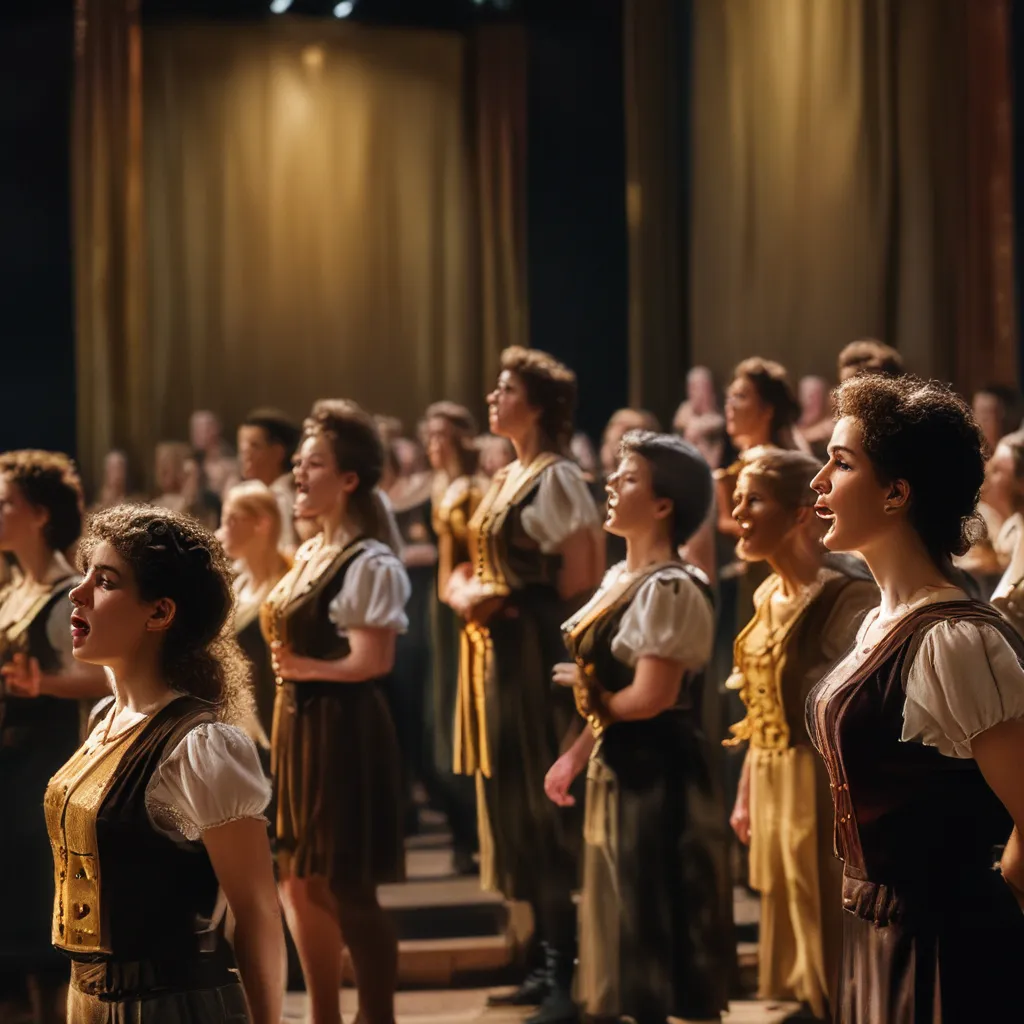
Mastering the Art of Vocal Agility in Musical Theater
As a lifelong lover of musical theater, I’ve always been fascinated by the incredible vocal dexterity required to tackle the genre’s most complex scores. From the lightning-fast patter songs of Gilbert and Sullivan to the sweeping, chromatic melodies of Stephen Sondheim, the vocal demands placed on musical theater performers are truly awe-inspiring.
If you’re an aspiring musical theater singer, you might be wondering how on earth you can develop the kind of vocal agility needed to do justice to these intricate works. After all, the sheer volume of notes, the rapid-fire delivery, and the need to seamlessly navigate between chest voice and head voice can seem downright daunting.
As one Quora user aptly noted, “Musical theater songs are difficult to sing because they require singers to be absolute masters of their instrument. The range, speed, and vocal gymnastics required are incredibly challenging.”
Embracing the Challenge
But you know what? That’s precisely why I love this art form so much. The thrill of tackling a fiendishly difficult score and pulling it off with aplomb is what keeps me coming back for more. And I firmly believe that with the right training, dedication, and mindset, you can develop the vocal agility needed to conquer even the most complex musical theater repertoire.
As vocal coach Nathalie Doucet so eloquently stated, “The most important thing is to remind myself when I don’t meet my own expectations to not beat myself up about it. After all, I am the one setting my own goals mostly, and so I can also be the one to take them off of my own plate.”
Developing a Holistic Approach
You see, the key to mastering vocal agility in musical theater isn’t just about endless hours of technical practice (although that’s certainly important). It’s about adopting a holistic approach that nourishes both your body and your mind.
Sure, you’ll need to put in the hard work of developing a rock-solid technique, honing your breath control, and strengthening your vocal range. But you’ll also need to cultivate mental resilience, learn to manage stress and fatigue, and find ways to keep your passion for the art form alive.
Building a Solid Technical Foundation
Let’s start with the technical side of things. As that Quora user pointed out, the vocal demands of musical theater are truly formidable. We’re talking about lightning-fast patter sections, expansive melodic leaps, and the need to seamlessly transition between chest voice and head voice.
To tackle these challenges, you’ll need to develop a deep understanding of vocal technique and a keen awareness of how your instrument works. This means mastering the fundamentals of breath support, vowel placement, and resonance, as well as learning how to navigate the different registers of your voice with ease.
It’s also crucial to build up your vocal stamina and endurance. Many musical theater scores require singers to sustain intense vocal output for long periods, often with little to no rest. By implementing smart vocal warm-ups, incorporating interval training, and learning to pace yourself, you can develop the stamina needed to power through even the most demanding scores.
Cultivating Mental Resilience
But technical mastery alone isn’t enough. As Nathalie Doucet wisely observed, it’s also crucial to cultivate mental resilience and the ability to manage stress and fatigue.
After all, the world of musical theater is notoriously high-pressure, with countless rehearsals, quick costume changes, and the ever-present specter of opening night. If you’re not careful, the mental and emotional toll can start to undermine your technical abilities.
That’s why it’s so important to develop strategies for managing stress, maintaining focus, and keeping your passion for the art form alive. This might involve things like meditation, journaling, or simply carving out time for self-care and relaxation.
Embracing the Collaborative Spirit
Another key aspect of mastering vocal agility in musical theater is learning to embrace the collaborative nature of the art form. As vocal coach Val Morehouse eloquently stated, “Being a collaborative artist is extremely rewarding. It is like a calling for most of us, and we would never want it any other way.”
In the world of musical theater, you’ll be working closely with a whole team of creative professionals – directors, choreographers, music directors, and, of course, your accompanist. Learning to communicate effectively, listen actively, and adapt to the needs of the production will be key to your success.
And don’t forget the importance of building strong relationships with your fellow performers. The camaraderie and mutual support of the ensemble can be a powerful source of inspiration and motivation, helping you push through even the most grueling rehearsal schedules.
Embracing the Lifelong Learning Journey
Finally, it’s important to remember that the journey of developing vocal agility in musical theater is a lifelong one. There will always be new challenges to tackle, new techniques to master, and new creative horizons to explore.
But that’s part of the joy of this art form. As you continue to push the boundaries of your vocal abilities, you’ll find yourself growing and evolving as an artist in ways you never imagined. And who knows – you might just discover a whole new world of musical theater repertoire that resonates with you in ways you never expected.
So embrace the challenge, trust in your training, and never stop exploring the limitless possibilities of the human voice. After all, as the great Musical Theater Center likes to say, “The only limit is your imagination.”

